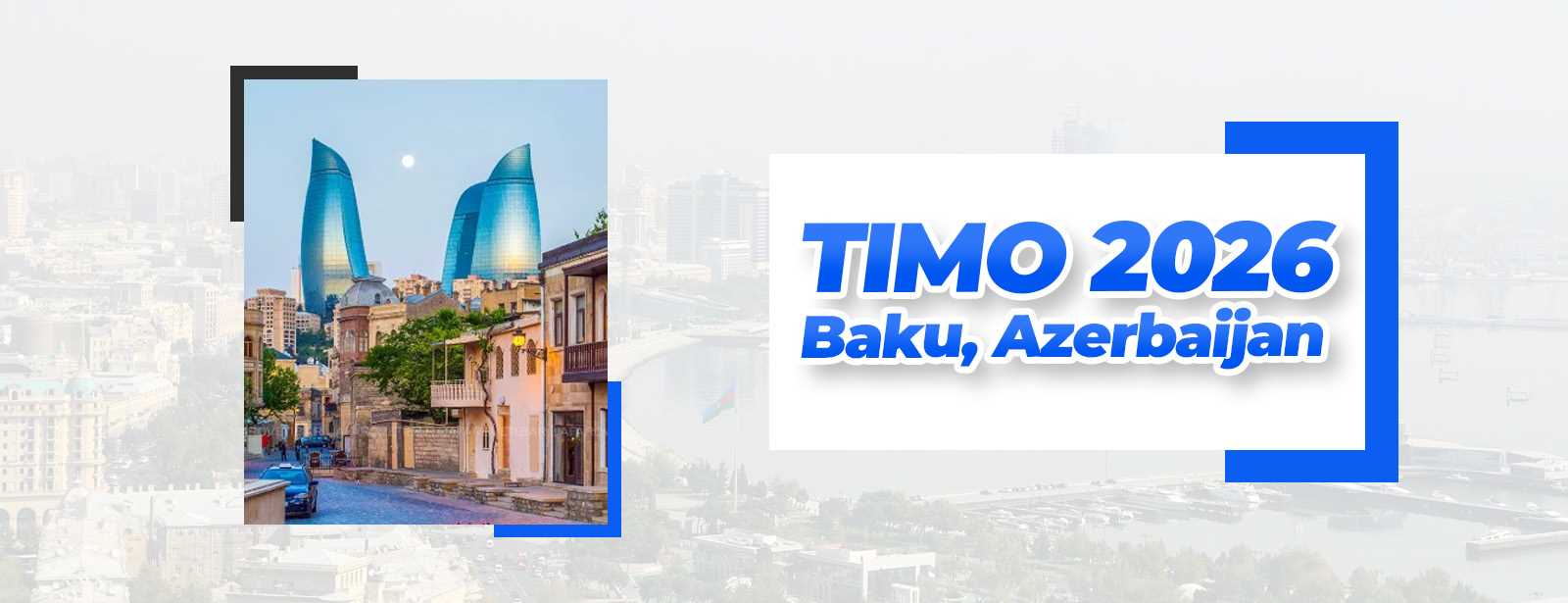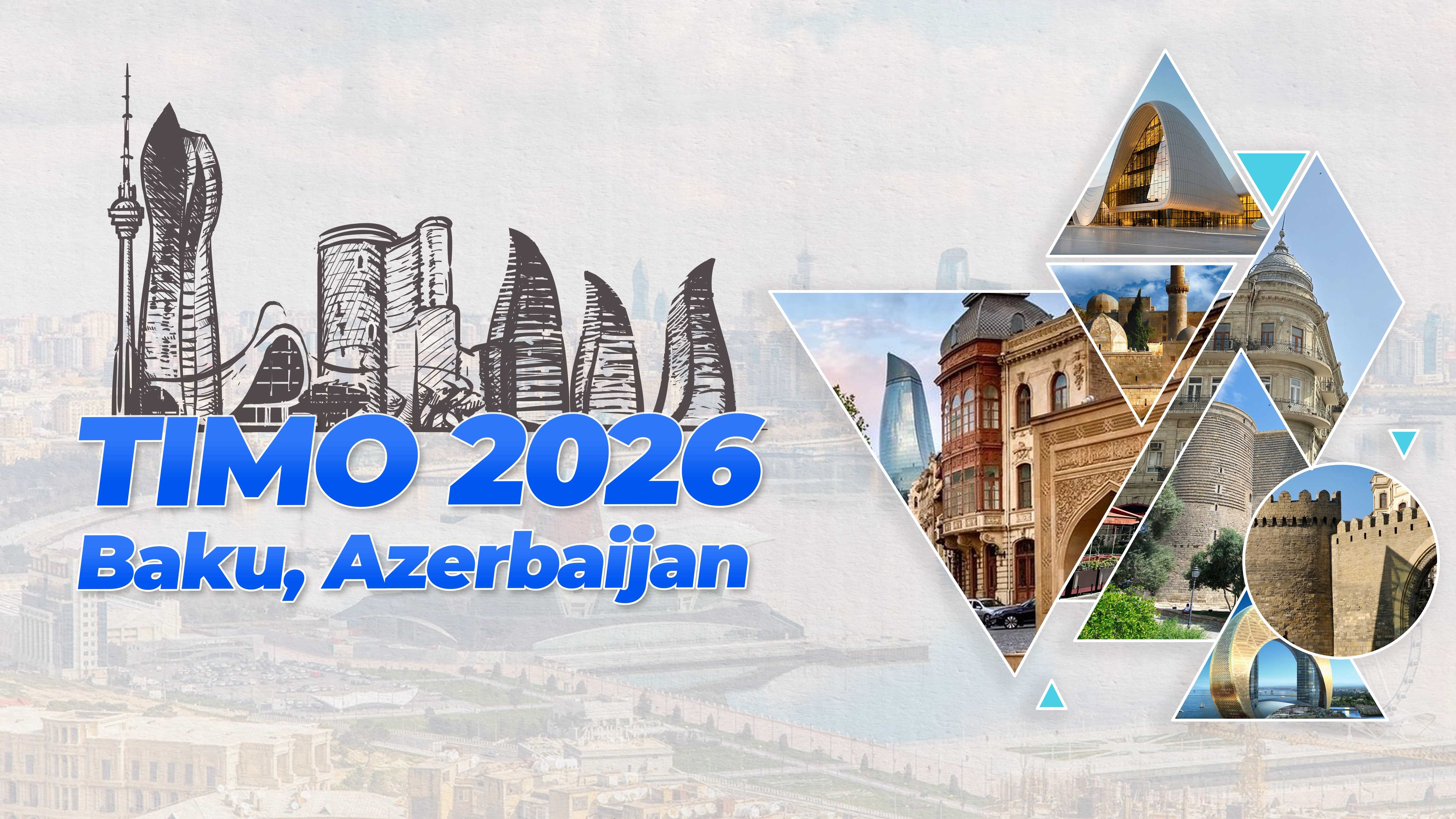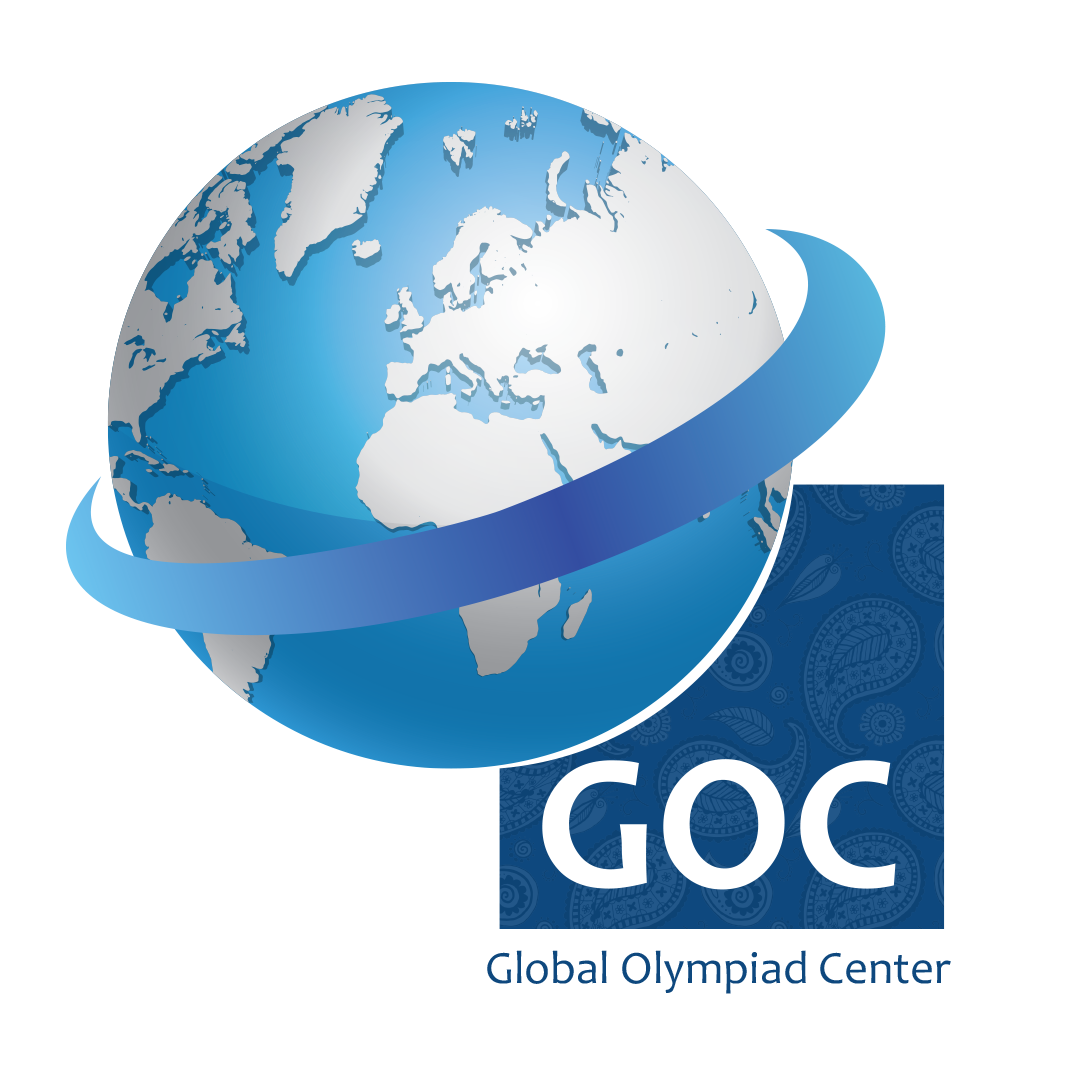
1.1. TIMO — Turkic International Mathematical Olympiad.
1.2. National/Selection Round — the country-level qualifying stage conducted by an Official Partner.
1.3. Final — the international stage held in Baku, Azerbaijan, 25–29 May 2026.
1.4. TIB — TIMO International Board.
1.5. Annual Rules — the year-specific operational calendar, procedures, fees, and technical requirements.
1.6. These General Website Rules apply together with the Annual Rules; in case of inconsistency, the Annual Rules prevail.
2.1. Official languages are defined in Section 3 and in the Annual Rules.
2.2. In case of divergence among language versions, the English version prevails.
3.1. TIMO is held annually.
3.2. In force-majeure or necessity, the TIB may switch to online/hybrid format.
3.3. In online/hybrid mode these Rules apply to the maximum extent; additional proctoring and security requirements are set in the Annual Rules.
4.1. Official interpretation of the Rules and final decision-making authority rest with the TIB.
4.2. Operational organization is implemented by the Organizing Committee (OC).
5.1. Official announcements are published only on TIMO’s official website(s).
5.2. Contact: [email protected] (current URLs and contacts are specified in the Annual Rules).
6.1. Eligible grades: II–XII; Grade XII students compete in the Grade XI category at the Final.
6.2. Participation is only via an Official Partner; partner selection and team formation are conducted under transparent national procedures.
6.3. All medalists of the Selection Round are eligible to participate in the Final. In exceptional cases, the TIB may invite additional candidates for specific countries; such cases are defined in the Annual Rules.
7.1. Official languages: English, Russian, Turkish.
7.2. A country partner may also conduct the exam in its national language; the partner is responsible for translation accuracy and content equivalence.
8.1. Duration: 75 (II G) 90 minutes; number of questions: 20 (II G)25; format: multiple-choice.
8.2. Allowed materials: black/blue pen, eraser, clear ruler.
8.3. Prohibited: calculators, smart watches/phones, electronic devices, personal notes.
9.1. Scoring: Correct +4, Wrong –1, Blank 0; maximum 100.
9.2. Final qualification thresholds: 91–100 Gold, 75–90 Silver, 50–74 Bronze, 40–49 Honorable Mention (all qualify to the Final); 1–39 Participation (no Final qualification).
9.3. Team scores are not calculated in the Selection Round.
9.4. Selection Round medals and recognition
9.4.1. Gold (91–100), Silver (75–90), Bronze (50–74), Honorable Mention (40–49) are awarded.
9.4.2. These awards carry Final qualification rights (see 9.2).
9.4.3. Certificates are issued digitally; physical medals/plaques are at the country partner’s discretion and are announced nationally/annually.
9.4.4. Local sponsor gifts may be provided by countries; they do not affect official results or qualification rules.
10.1. Within 3 hours after the exam, complaints limited to text/print/ambiguity may be submitted by the country leader via the official form.
10.2. Decisions may be applied uniformly across all halls.
10.3. This window does not replace the Moderation procedure (Section 4).
10.4. Appeal (Selection Round).
10.4.1. Appeals begin after results are announced (not immediately after the exam).
10.4.2. Only the country representative/leader may submit appeals via the official form.
10.4.3. Purpose: to ensure fairness; reasoned technical/content matters are examined and, if needed, escalated to the OC.
10.4.4. Any remedies (score adjustment, item neutralization, etc.) are formalized by protocol and applied uniformly to all relevant halls/countries.
11.1. In online mode, a single-tab/single-window policy applies; remote proctoring and audit logs are enforced.
11.2. Contestants may use only the official platform and allowed resources.
12.1. Finalists are those who earned a valid Final invitation via the Selection Round.
12.2. Results are calculated individually and by team; the team score equals the sum of all finalists’ scores of the same country.
13.1. Official languages: English.
13.2. Upon request, the paper may be translated into the country language for an additional fee (mechanism set in the Annual Rules).
13.3. Evaluation is always based on the English master. Confirmed translation errors in EN are neutralized in favor of all contestants; errors in other languages do not affect official results.
14.1. Duration: 120 minutes; 25 questions.
14.2. Format: primarily multiple-choice; open-ended/analytical problems may be included.
14.3. Inclusion of open-ended problems is officially announced at least 30 days prior to the exam.
15.1. Entry only with ID and badge; lateness tolerance: 15 minutes.
15.2. Leaving the hall only with invigilator permission; restroom breaks under escort.
15.3. Prohibited equipment: calculators, smart devices, electronic devices, personal notes.
15.4. IB/EB members may not enter exam halls during the session; only invigilators, security and medical staff (where needed) may be present.
15.5. Task booklets are distributed in sealed containers; unused materials are collected and securely destroyed after the exam.
16.1. For transparency, video monitoring is used; public livestream may show general views only via official channels.
16.2. To protect personal data, no close-up faces, answer sheets, or personal details are shown; audio may be limited or muted.
16.3. Recordings are archived; retention and access are defined in the Annual Rules.
16.4. Parental/guardian consent may be required; media usage follows Section 1 and the Annual Rules.
17.1. Final scoring: +4 / –1 / 0; maximum 100.
17.2. If open-ended items are used, rubric-based marking applies; partial credit is awarded only per rubric.
17.3. The Jury oversees the marking process.
18.1. After marking is complete, leaders receive contestants’ scores, answer summaries, and jury comments.
18.2. Documented sanction decisions related to rule violations are communicated to the parties.
19.1. If a tie affects World 1st/2nd/3rd, a mandatory Tiebreak Exam (short, new items) is held.
19.2. The tiebreak outcome prevails; if still tied, order of precedence: time → age → Jury decision.
19.3. For ties affecting medal cut-offs but not top-3, apply 19.2.
20.1. In both stages, within 3 hours after the exam, leaders may submit initial complaints limited to text/print/ambiguity via the official form.
20.2. Moderation (Final) begins after results are announced and lasts 4 hours; one representative per country; 10-minute presentation + Q&A.
20.3. If a question/key is faulty, the remedy is applied in favor of all contestants; otherwise, results remain unchanged.
20.4. Appeals on open-ended items must cite the rubric with reasoned justification.
20.5. Jury decisions are final.
21.1. Medal distribution (relative): Top 8% — Gold, next 15% — Silver, next 30% — Bronze, up to the next 50% — Honorable Mention.
21.2. Special awards: World Champion (per grade), Second Place, Third Place, Best Student of Each Country, etc.
21.3. All contestants and leaders receive Certificates of Participation.
21.4. Policies for publishing tasks and official keys are set in the Annual Rules.
21.5. SS Category – University admission & scholarships
21.5.1. High-performing SS-category finalists may be considered for admission by selected universities.
21.5.2. Scholarships may be offered by universities (e.g., 100% / 75% / 50% / 25%).
21.5.3. Terms, quotas, and criteria are determined by the universities and announced via official channels.
22.1. Plagiarism, cheating, third-party assistance, or use of prohibited devices may lead to sanctions including disqualification.
22.2. In Conflict-of-Interest (COI) situations, relevant persons must not supervise or assess contestants from their own school/country.
23.1. The Selection Round is fee-based; the amount is set and announced by the country partner.
23.2. Payment channels and deadlines are specified nationally.
24.1. The Final is fee-based; tariffs are announced in advance by the Organizer.
24.2. Sample packages (as approved in the Annual Rules): Standard, Economy, Parent (Economy).
24.3. Official translation into a country language at the Final is an additional paid service.
25.1. Refund matrix: by 30 Mar 2026 — 80%; by 30 Apr 2026 — 50%; by 10 May 2026 — 25%; last 15 days and no-show — no refund.
25.2. Force-majeure requests are assessed individually.
25.3. Receipt/confirmation mechanisms and pro forma invoice rules are defined in the Annual Rules.
26.1. Eligible applicants: public/private educational institutions, NGOs, associations, and other legal entities.
26.2. Phases: Preliminary (by 31 October), Early-bird (by 1 February), Late (as per Annual Rules; typically ≥1 month before the Final).
26.3. Acceptance/rejection is decided by the TIB based on criteria; additional information may be requested if necessary.
27.1. After at least one year of participation, an institution may apply for a 3-year agreement.
27.2. Once approved: exclusive Official Partner status for the country and the right to use TIMO logo/brand elements in national events.
27.3. During the 3-year term, no other applications from the same country are accepted.
28.1. Organize national selection and provide an annual roadmap.
28.2. Comply with data protection, ethics, and COI policies.
28.3. Submit quarterly brief reports and comply with official communications.
29.1. Logo/brand use only with written authorization and per brand-book.
29.2. In case of breach, falsification, ethical violations, or inactivity, the TIB may suspend/terminate status.
30.1. The OC may amend dates, formats, procedures, or technical requirements in cases of necessity or force-majeure.
30.2. Changes are announced in advance via official channels and apply prospectively only.
30.3. If inconsistent with the Annual Rules, the Annual Rules prevail.
31.1. Technical issues on content and marking are governed by Section 4 (Moderation and Complaints).
31.2. Administrative complaints on services/governance are submitted in writing to the OC.
31.3. Mediation/ADR may be used upon mutual consent.
31.4. Official interpretation and final decisions rest with the TIB.
31.5. Governing law and jurisdiction are specified in the Annual Rules.
32.1. Tasks, keys, rubrics, protocols and other materials are protected; unauthorized reproduction/distribution is prohibited.
32.2. Use of the TIMO name, logo and brand elements requires written permission and compliance with the brand-book.
32.3. Official partners must ensure transparency and quality in brand use.
33.1. All staff and partners must comply with child-safety policies; background checks may be required.
33.2. An anonymous reporting channel is provided; urgent cases are handled with law enforcement and social services.
33.3. Media imagery requires appropriate parent/guardian consent.
34.1. Official invitation letters are provided; ASAN e-Visa is available for many countries (typically 3 business days).
34.2. Airport–hotel–venue transfers are provided per the Annual Rules; official hotels are 4–5★.
34.3. 24/7 security and medical support are ensured.
34.4. Online/hybrid contingency: secure platform, single-tab/single-window, remote proctoring, identity checks, and audit logs.
35.1. Personal data are processed for registration, accreditation, certification and statistics.
35.2. Retention: answer sheets/scans 12 months; final protocols and certificate registers 5 years.
35.3. Photo/video use requires proper consents; public streams exclude close-up faces and answer sheets.
35.4. Data transfers/disclosures follow applicable law.
36.1. Requests for physical access, seating, extra time, etc., must be submitted by the deadline with medical justification (see Annual Rules).
36.2. Accommodations must not compromise exam integrity or security.
36.3. Decisions are confirmed in writing and communicated to relevant staff.
37.1. Applies together with Section 4, Article 22.
37.2. In COI situations, authors/markers/translators/invigilators must not supervise or assess contestants from their own school/country.
37.3. Sanctions for violations include warning, score nullification, stage or overall disqualification.
37.4. All sanctions are documented and notified; decisions are final.

{{globalRoundPlanDescription}}
The TIMO Global Round will be held from May 22–26, 2025, in Baku, Azerbaijan. This year’s event will gather talented students from around the world for an unforgettable academic and cultural experience. The program will include comfortable accommodation, guided visits to Baku’s most remarkable historical and cultural landmarks, the TIMO Final Exam, and the prestigious Awards Ceremony. Participants will explore iconic sites such as the Old City, Maiden Tower, Flame Towers, and the Heydar Aliyev Center, while also enjoying cultural performances and talent showcases. This global event will not only challenge students with high-level mathematics competitions but also allow them to connect across cultures, celebrate diversity, and create lifelong memories in the vibrant city of Baku.
Official country partner managing TIMO in your region

Global Olympiad Center - GOC
Country:
Sterling Committee: Khayal Ibrahimzada
Global Olympiad Center (GOC) is a leading educational organization in Azerbaijan, specializing in the administration of international academic olympiads, assessment programs, and competitive learning platforms. GOC collaborates with globally recognized olympiad committees and educational institutions to organize national rounds, selection exams, training programs, and international finals across a wide range of academic disciplines. Through its accredited partnerships, GOC provides students with access to high-standard problem-solving environments, competency-based assessment models, and globally benchmarked evaluation criteria. The Center actively supports schools, teachers, and families by promoting academic excellence, analytical thinking, and competitive readiness aligned with international education frameworks. With thousands of participants annually, GOC plays a key role in strengthening students’ portfolios, global competencies, and pathways toward international academic achievement.




















